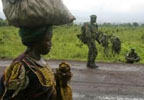
Enough researcher Fidel Bafilemba filed a new field dispatch today from Goma that describes the daily evidence of the excesses – particularly startling in contrast to the widespread poverty – that the conflict minerals trade fosters among the ranks of armed groups in eastern Congo. He also offers a valuable report out on how news of the new conflict minerals law in the United States is being received in Congo. Here’s an insightful passage:
This legislation was welcomed by the Congolese government, and Minister of Information Lambert Mende called it a “noble initiative” – an opinion largely shared by civil society groups here in Goma, who called upon the European Union, and especially Belgium, to follow in the United States’ footsteps. The Congolese Catholic Church also issued a statement welcoming the bill. But Congolese civil society groups also have understandable questions about how the bill will be implemented, what measures will be taken to avoid unintended consequences, and how they can participate in the process. It will be important to make sure that information flows freely between Congolese and international organizations as implementation of the legislation moves forward.
During meetings with individual members of the mining dealers’ association in Goma and with some officials who wanted to remain anonymous, opinions were divided about the potential impact of the U.S. legislation on the business climate, employment, and security in Congo. Some think that demanding that multinational companies comply with such requirements in a country as vast as Congo—and where such a dense web of local and foreign militias, army units, and political and administrative authorities collude in minerals trafficking—could trigger a de facto boycott of Congolese minerals. The worst-case scenario would be where miners who lose their livelihoods join up with armed groups for lack of an alternative. However it is important to remember that many of the same traders who worry about a boycott are those that have made fortunes from the militarized trade during the past decade.
Click here to read Fidel’s full field dispatch.

